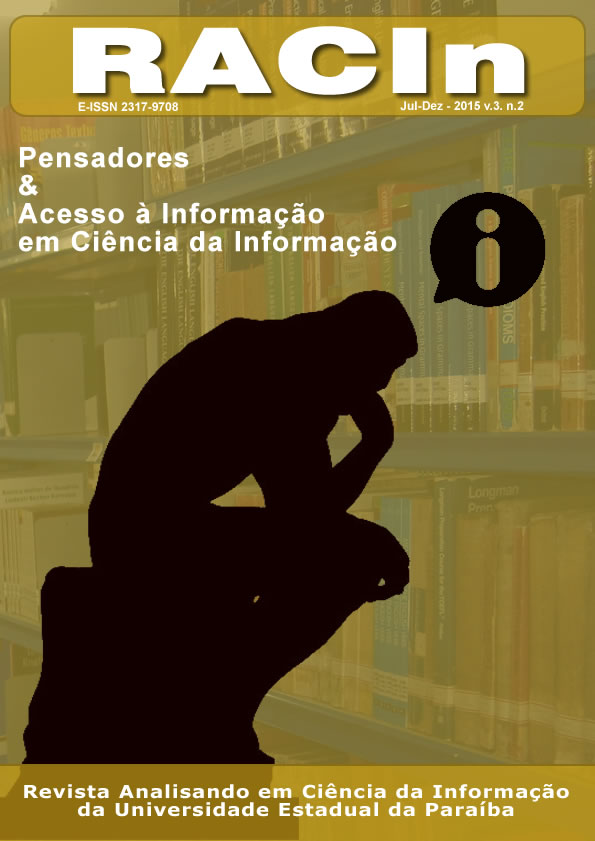ANTHONY WILDEN AND DIALECTICAL INFORMATION
Keywords:
Information, Dialectic, Anthony WildenAbstract
This paper aims to address the problem of conceptual ambiguity of information to display and check the relevance of the theoretical contribution of the British researcher Anthony Wilden to information science, specifically regarding the concept of information. To do so, we examine the said author's work in the light of the dialectical method, from a brief literature review on the topic. As a result, this study shows that the dialectical epistemology is able to overcome limits of the scientific discourse, constrained by the analytic tradition, concluding that Wilden opens the way to build a theory of information that, at the same time, can meet the rigors of the scientific method and keep committed to social issues, wich is fundamental for an applied social science, such as information science.
References
BRAGA, G. M. Informação, ciência da informação: breves reflexos em três tempos. Ciência da Informação, Brasília, v. 24, n. 1, p.84-88, 1995.
CAPURRO, R.; HJORLAND, B. O conceito de informação. Perspectivas em Ciência da Informação, v. 12, n. 1, p. 148-207, 2007.
CHALMERS, A. F. What is this thing called science? 3. ed. Buckingham: Open University, 1999.
HEGEL, F. Fenomenologia do espírito. Petrópolis: Vozes, 1997.
ILHARCO, F. Filosofia da informação: alguns problemas fundadores. In: CONGRESSO IBÉRICO DE CIÊNCIAS DA COMUNICAÇÃO, 2., 2004, Covilhã (Portugal). Anais... Covilhã: Universidade da Beira Interior, 2004. Disponível em: <http://www.ucp.pt/site/resources/documents/FCH/F%20Ilharco/fernando_ilharco_filosofia_informacao_problemas_fundadores.pdf> Acesso em: 14 out. 2015.
JAPIASSU, H.; MARCONDES, D. Dicionário de Filosofia. Rio de Janeiro: Jorge Zahar, 2001.
MARX, K. O capital: crítica da economia política. Rio de Janeiro: Civilização Brasileira, 2008.
PINHEIRO, L. V. R., LOUREIRO, J. M. M. Traçados e limites da ciência da informação. Ciência da Informação, Brasília, v. 24, n. 1, p. 42-53, 1995.
SARACEVIC, T. The concept of "relevance" in Information Science: an historical review. Introduction to Information Science, New York: R.R. Bowker Co., 1970.
SHANNON, C.; WEAVER, W. The mathematical theory of Communication, Urbana: Illinois Univ. Press, 1949.
SHERA, J. H.; CLEVELAND, D. B. History and foundations of Information Science. Annual Review of Information Science and Technology, v. 12, p. 248-275, 1977.
WILDEN, A. Informação. Enciclopédia Einaudi: comunicação-cognição. Lisboa: Imprensa Nacional-Casa da Moeda, 2001a. v. 34.
_______. Comunicação. Enciclopédia Einaudi: comunicação-cognição. Lisboa: Imprensa Nacional-Casa da Moeda, 2001b. v. 34.
Downloads
Published
How to Cite
Issue
Section
License
Copyright (c) 2024 Revista Analisando em Ciência da Informação

This work is licensed under a Creative Commons Attribution-NonCommercial-NoDerivatives 4.0 International License.
As publicações da RACIn estão licenciados sob a Licença Creative Commons CC BY-NC.





